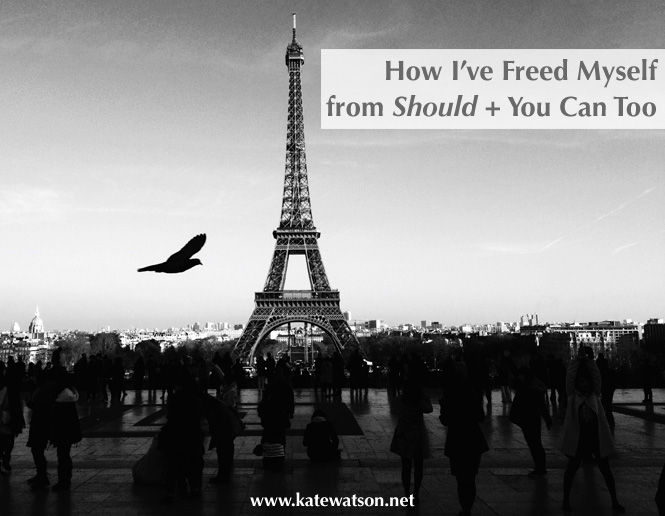I’ve freed myself from the word “should” and, today, I’d like to help you do it too.
Should is the very devil of a word, isn’t it?
“I should be…”
“She should know better.”
“He should take more responsibility for …”
“They shouldn’t let their kids do that.”

You don’t feel good about yourself or others when you’re living with shoulds. When you use it against yourself, it can create unnecessary stress, low self-esteem, and even depression and, when used against others, it can manifest strife.
When turned inward, should can start your gremlins chattering: “I should be working” turns into “You’re so lazy. What’s wrong with you? You’ll never amount to anything.” Yuck!
When turned outward, “she should know better” turns into “What is her problem? God, what a beeyotch. I’ve had it!”And studies show that venting your anger escalates situations rather than diminishes the stress.
Should and Ourselves
IMHO, there’s nothing constructive about should. But what can you do instead? Here’s what I do when I’m shoulding myself:
Reframe the statement. Instead of thinking “I should be washing dishes,” how about, “If I want the kitchen to be clean before I start dinner, I need to wash the dishes soon.” Ok, that gives you some options around it, right? If you don’t clean the dishes now, you can clean them immediately before you start dinner, order in some pizza, or just work with the mess. Now that’s constructive. 😉
Ask questions. Walk through the following series of questions to diagnose the dilemma. For example:
- Initial statement: I should be blogging.
- Why should I blog today? — Because I have a schedule to adhere to.
- Why am I not doing it? — Because I don’t feel like it.
- Is there a way I can blog today? — I guess.
- How would doing it feel? — Like work.
- Can I let go of the need to do this right now? — Yes, but then I’ll feel guilty.
- Is there anything I can do instead from a place of love and self-acceptance? — Yes, I can post a photo and inspirational quote instead. — Or yes, I can go on a nature walk and wait until I feel inspired. No one will yell at me if I’m a day late on today’s post. Cool, problem solved!
Reframing the statement or asking questions are what I do whenever the shoulds creep into my consciousness. But there are other solutions, too.
Replace should with could. Motivational author and speaker Louise Hay writes in her bestseller You Can Heal Your Life that “every time we use should, we are, in effect, saying ‘wrong.’ Either we are wrong or we were wrong or we are going to be wrong.”
Instead she suggests that we replace our shoulds with coulds. For example, instead of saying, “I should go to film school,” say “If I really wanted to, I could go to film school.” Doesn’t that feel better? And you could follow up with the question, “Then, why haven’t I?” That leads to more insightful answers like, “Because I don’t really want to,” or “Because I don’t feel ready,” versus castigating ourselves for being wrong.
As Louise writes, “We often find [we] have been berating [ourselves] for years for something [we] never wanted to do in the first place. Or [we] have been criticizing [ourselves] for not doing something when it was never [our] idea to begin with. Often it was just something that someone else said [we] ‘should’ do. When [we] can see that, [we] can just drop it from the ‘should list.’ What a relief that is.”
Should and Others
Ok, so you now have some options to use instead of shoulding yourself, but what about when you should others?
Although this has not come naturally for me — yeah, I’m a tad opinionated 😉 — I try to remember that it’s not my job to review and comment on the actions of others. Because it’s not, right? I’m not the judgment police and how I choose to live my life doesn’t inform or influence how others choose to live theirs. And so I generally don’t think of other people in terms of shoulds anymore. That also makes it easier to not should myself.
I now choose to look at another person’s actions from the perspective that they’re doing the best they can with their abilities and understanding in that moment, and invariably I feel more at peace with the outcome whatever it may be.
Either someone is going to do something or they’re not. Either I’m going to do something or I’m not—because I too am doing the best I can with my abilities and understanding in this moment. Letting go of the judgment, the should, the application of rightness or wrongness, is freeing.
And with that, I’m going to take a big ol’ breath and let go of shoulds and close out this post.
Cheers,

















